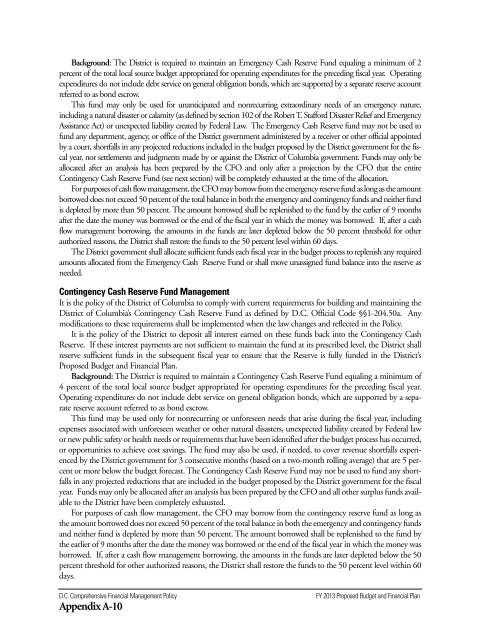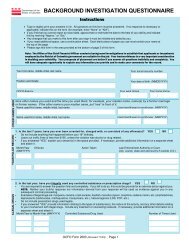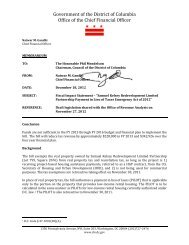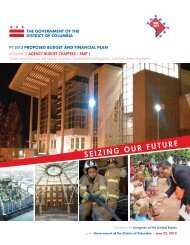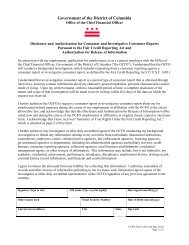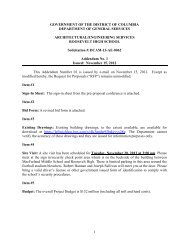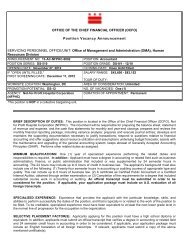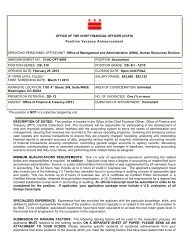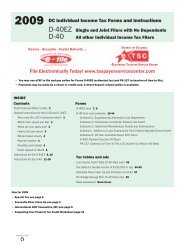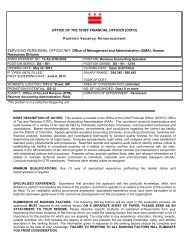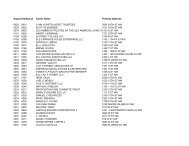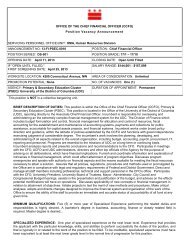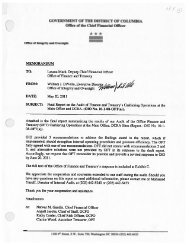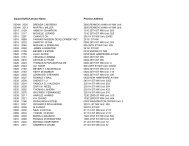Volume 1 - Executive Summary - Office of the Chief Financial Officer
Volume 1 - Executive Summary - Office of the Chief Financial Officer
Volume 1 - Executive Summary - Office of the Chief Financial Officer
Create successful ePaper yourself
Turn your PDF publications into a flip-book with our unique Google optimized e-Paper software.
Background: The District is required to maintain an Emergency Cash Reserve Fund equaling a minimum <strong>of</strong> 2<br />
percent <strong>of</strong> <strong>the</strong> total local source budget appropriated for operating expenditures for <strong>the</strong> preceding fiscal year. Operating<br />
expenditures do not include debt service on general obligation bonds, which are supported by a separate reserve account<br />
referred to as bond escrow.<br />
This fund may only be used for unanticipated and nonrecurring extraordinary needs <strong>of</strong> an emergency nature,<br />
including a natural disaster or calamity (as defined by section 102 <strong>of</strong> <strong>the</strong> Robert T. Stafford Disaster Relief and Emergency<br />
Assistance Act) or unexpected liability created by Federal Law. The Emergency Cash Reserve fund may not be used to<br />
fund any department, agency, or <strong>of</strong>fice <strong>of</strong> <strong>the</strong> District government administered by a receiver or o<strong>the</strong>r <strong>of</strong>ficial appointed<br />
by a court, shortfalls in any projected reductions included in <strong>the</strong> budget proposed by <strong>the</strong> District government for <strong>the</strong> fiscal<br />
year, nor settlements and judgments made by or against <strong>the</strong> District <strong>of</strong> Columbia government. Funds may only be<br />
allocated after an analysis has been prepared by <strong>the</strong> CFO and only after a projection by <strong>the</strong> CFO that <strong>the</strong> entire<br />
Contingency Cash Reserve Fund (see next section) will be completely exhausted at <strong>the</strong> time <strong>of</strong> <strong>the</strong> allocation.<br />
For purposes <strong>of</strong> cash flow management, <strong>the</strong> CFO may borrow from <strong>the</strong> emergency reserve fund as long as <strong>the</strong> amount<br />
borrowed does not exceed 50 percent <strong>of</strong> <strong>the</strong> total balance in both <strong>the</strong> emergency and contingency funds and nei<strong>the</strong>r fund<br />
is depleted by more than 50 percent. The amount borrowed shall be replenished to <strong>the</strong> fund by <strong>the</strong> earlier <strong>of</strong> 9 months<br />
after <strong>the</strong> date <strong>the</strong> money was borrowed or <strong>the</strong> end <strong>of</strong> <strong>the</strong> fiscal year in which <strong>the</strong> money was borrowed. If, after a cash<br />
flow management borrowing, <strong>the</strong> amounts in <strong>the</strong> funds are later depleted below <strong>the</strong> 50 percent threshold for o<strong>the</strong>r<br />
authorized reasons, <strong>the</strong> District shall restore <strong>the</strong> funds to <strong>the</strong> 50 percent level within 60 days.<br />
The District government shall allocate sufficient funds each fiscal year in <strong>the</strong> budget process to replenish any required<br />
amounts allocated from <strong>the</strong> Emergency Cash Reserve Fund or shall move unassigned fund balance into <strong>the</strong> reserve as<br />
needed.<br />
Contingency Cash Reserve Fund Management<br />
It is <strong>the</strong> policy <strong>of</strong> <strong>the</strong> District <strong>of</strong> Columbia to comply with current requirements for building and maintaining <strong>the</strong><br />
District <strong>of</strong> Columbia’s Contingency Cash Reserve Fund as defined by D.C. Official Code §§1-204.50a. Any<br />
modifications to <strong>the</strong>se requirements shall be implemented when <strong>the</strong> law changes and reflected in <strong>the</strong> Policy.<br />
It is <strong>the</strong> policy <strong>of</strong> <strong>the</strong> District to deposit all interest earned on <strong>the</strong>se funds back into <strong>the</strong> Contingency Cash<br />
Reserve. If <strong>the</strong>se interest payments are not sufficient to maintain <strong>the</strong> fund at its prescribed level, <strong>the</strong> District shall<br />
reserve sufficient funds in <strong>the</strong> subsequent fiscal year to ensure that <strong>the</strong> Reserve is fully funded in <strong>the</strong> District’s<br />
Proposed Budget and <strong>Financial</strong> Plan.<br />
Background: The District is required to maintain a Contingency Cash Reserve Fund equaling a minimum <strong>of</strong><br />
4 percent <strong>of</strong> <strong>the</strong> total local source budget appropriated for operating expenditures for <strong>the</strong> preceding fiscal year.<br />
Operating expenditures do not include debt service on general obligation bonds, which are supported by a separate<br />
reserve account referred to as bond escrow.<br />
This fund may be used only for nonrecurring or unforeseen needs that arise during <strong>the</strong> fiscal year, including<br />
expenses associated with unforeseen wea<strong>the</strong>r or o<strong>the</strong>r natural disasters, unexpected liability created by Federal law<br />
or new public safety or health needs or requirements that have been identified after <strong>the</strong> budget process has occurred,<br />
or opportunities to achieve cost savings. The fund may also be used, if needed, to cover revenue shortfalls experienced<br />
by <strong>the</strong> District government for 3 consecutive months (based on a two-month rolling average) that are 5 percent<br />
or more below <strong>the</strong> budget forecast. The Contingency Cash Reserve Fund may not be used to fund any shortfalls<br />
in any projected reductions that are included in <strong>the</strong> budget proposed by <strong>the</strong> District government for <strong>the</strong> fiscal<br />
year. Funds may only be allocated after an analysis has been prepared by <strong>the</strong> CFO and all o<strong>the</strong>r surplus funds available<br />
to <strong>the</strong> District have been completely exhausted.<br />
For purposes <strong>of</strong> cash flow management, <strong>the</strong> CFO may borrow from <strong>the</strong> contingency reserve fund as long as<br />
<strong>the</strong> amount borrowed does not exceed 50 percent <strong>of</strong> <strong>the</strong> total balance in both <strong>the</strong> emergency and contingency funds<br />
and nei<strong>the</strong>r fund is depleted by more than 50 percent. The amount borrowed shall be replenished to <strong>the</strong> fund by<br />
<strong>the</strong> earlier <strong>of</strong> 9 months after <strong>the</strong> date <strong>the</strong> money was borrowed or <strong>the</strong> end <strong>of</strong> <strong>the</strong> fiscal year in which <strong>the</strong> money was<br />
borrowed. If, after a cash flow management borrowing, <strong>the</strong> amounts in <strong>the</strong> funds are later depleted below <strong>the</strong> 50<br />
percent threshold for o<strong>the</strong>r authorized reasons, <strong>the</strong> District shall restore <strong>the</strong> funds to <strong>the</strong> 50 percent level within 60<br />
days.<br />
D.C. Comprehensive <strong>Financial</strong> Management Policy<br />
Appendix A-10<br />
FY 2013 Proposed Budget and <strong>Financial</strong> Plan


